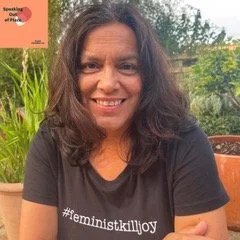In this episode of the Speaking Out of Place podcast, Professor David Palumbo-Liu and Azeezah Kanji talk with Sara Ahmed about her new book, The Feminist Killjoy Handbook. How and why is it that complaining about sexism, misogyny, homophobia, transphobia, and other forms of bigotry, is considered impolite? How is civility uncivil, and the mandate to be “happy” a tool for silencing grievances? Sara Ahmed tackles all those questions, and gives us strength and courage to keep on killingjoy and speaking truth.
Sara Ahmed is an independent queer feminist scholar of colour. Her work is concerned with how power is experienced and challenged in everyday life and institutional cultures. Her first trade book, The Feminist Killjoy Handbook is coming out with Seal Press next month. Previous books (all published by Duke University Press) include Complaint! (2021), What's The Use? On the Uses of Use (2019), Living a Feminist Life (2017), Willful Subjects (2014), On Being Included: Racism and Diversity in Institutional Life (2012), The Promise of Happiness (2010) and Queer Phenomenology: Objects, Orientations, Others (2006). She is currently writing A Complainer’s Handbook: A Guide to Building Less Hostile Institutions and has begun a new project on common sense.
SARA AHMED
She often said I was the daughter she didn't have. And I was the daughter she had, in fact, because I'll say that to you. And I got a lot from her. She was very much willing always to speak her mind. And I would watch her tell my father off. It would be just like, yeah, this is possible! And she was outspoken, but also very loving. She's no longer with us. I never came out to her in the sense of saying "I am a lesbian" or whatever, but I think she kind of knew. We had conversations, and I think she would have been okay with it. And because she was just a very, very curious and creative person and an enormous influence in my life.
*
So the door was shut. So when she said no, she ended up with nowhere to go. And that's one of the institutional mechanisms. You're more likely to progress if you say yes. It's a reproductive mechanism, which is why feminist culture knows so much about everything. We can explain how it is that institutions keep being reproduced in the same way. So what then do you do? Where do you go if your no has nowhere to go? And I think when you say no to the world, and you're pushed out by it, you still find your people. And that there's the world-making is in the people who find in the refusal of the institution a common ground.
Photo credit: Sarah Franklin
Speaking Out of Place, which carries on the spirit of Palumbo-Liu’s book of the same title, argues against the notion that we are voiceless and powerless, and that we need politicians and pundits and experts to speak for us.
Judith Butler on Speaking Out of Place:
“In this work we see how every critical analysis of homelessness, displacement, internment, violence, and exploitation is countered by emergent and intensifying social movements that move beyond national borders to the ideal of a planetary alliance. As an activist and a scholar, Palumbo-Liu shows us what vigilance means in these times. This book takes us through the wretched landscape of our world to the ideals of social transformation, calling for a place, the planet, where collective passions can bring about a true and radical democracy.”
David Palumbo-Liu is the Louise Hewlett Nixon Professor and Professor of Comparative Literature at Stanford University. He has written widely on issues of literary criticism and theory, culture and society, race, ethnicity and indigeneity, human rights, and environmental justice. His books include The Deliverance of Others: Reading Literature in a Global Age, and Speaking Out of Place: Getting Our Political Voices Back. His writing has appeared in The Washington Post, The Guardian, The Nation, Al Jazeera, Jacobin, Truthout, and other venues.
Bluesky @palumboliu.bsky.social
Apple Podcasts · Spotify · Website















































































